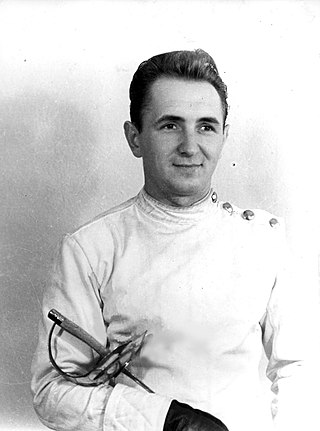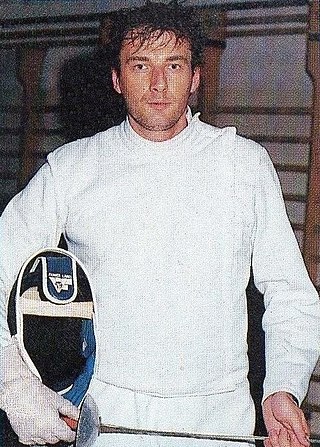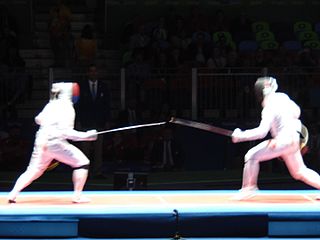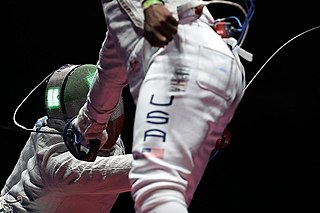
Mariel Leigh Zagunis is an American sabre fencer. She is a two-time Olympic champion in the individual sabre and the first American woman to win a gold medal in fencing at the Olympics. She was Team USA flag bearer in the 2012 Summer Olympics Parade of Nations. She has two Olympic bronze team medals and is a five-time Olympian.

The men's sabre was one of eight fencing events on the fencing at the 1964 Summer Olympics programme. It was the fifteenth appearance of the event. The competition was held from October 19 to 20, 1964. 52 fencers from 21 nations competed. Nations had been limited to three fencers each since 1928. The event was won by Tibor Pézsa, the final of nine straight Games in which a Hungarian fencer won the event. The silver medal went to Claude Arabo of France, with Umyar Mavlikhanov of the Soviet Union taking bronze.
Sergey Aleksandrovich Sharikov, also known as Serguei/Sergei Charikov, was a left-handed Russian Olympic champion sabre fencer. In the Olympics he won two gold medals, a silver medal, and a bronze medal.

The men's épée was a competition in fencing at the 2004 Summer Olympics in Athens. A total of 37 men from 21 nations competed in this event. Each nation was limited to 3 fencers. Competition took place in the Fencing Hall at the Helliniko Olympic Complex on August 17. The event was won by Marcel Fischer of Switzerland, the nation's first victory in the event and first medal of any color since 1952. Wang Lei's silver was China's first medal in the men's individual épée. Defending champion Pavel Kolobkov earned bronze, finishing a set of three different-colored Olympic medals in the event. Kolobkov was the fourth man to earn three medals in the event and had the best record of any of the four; only Ramón Fonst had more individual Olympic success in the men's épée. It was the fifth consecutive Games in which a Russian fencer reached the podium, including medals for Russian fencers competing for the Soviet Union (1988) and Unified Team (1992).

Aldo Montano III is an Italian fencer and a five-time Olympic medalist.

The men's sabre fencing competition at the 2008 Summer Olympics in Beijing took place on August 12 at the Olympic Green Convention Centre. There were 40 competitors from 21 nations. The event was won by Zhong Man of China, the nation's first medal in the men's sabre. Nicolas Lopez's silver put France back on the podium after a one-Games absence. Mihai Covaliu of Romania became the 13th man to win multiple medals in the event, adding a bronze to his 2000 gold medal.

The men's sabre was one of seven fencing events on the fencing at the 1948 Summer Olympics programme. It was the eleventh appearance of the event. The competition was held from 12 August 1948 to 13 August 1948. 60 fencers from 24 nations competed. Nations were limited to three fencers each. The event was won by Aladár Gerevich, the fifth of nine straight Games in which a Hungarian would win the event. Gerevich became the third man to win multiple medals in the individual sabre, adding to his 1936 bronze. Vincenzo Pinton of Italy took silver and Pál Kovács of Hungary took bronze; it was the third straight Games where the sabre podium was Hungary-Italy-Hungary.

The men's sabre was one of eight fencing events on the fencing at the 1968 Summer Olympics programme. It was the sixteenth appearance of the event. The competition was held from 16 to 17 October 1968. 40 fencers from 16 nations competed. Nations had been limited to three fencers each since 1928. The event was won by Jerzy Pawłowski of Poland, breaking a nine-Games string of Hungarian victories in the event. Hungary's best result in the event was Tibor Pézsa's bronze; Pézsa beat Pawłowski in the final pool but the Hungarian lost two other bouts while the Pole was otherwise flawless. Mark Rakita of the Soviet Union lost only to Pawłowski in the final pool, forcing another bout to break the tie between them for gold and silver; that barrage bout was decided by a single point as Pawłowski beat Rakita 5–4.

The men's sabre was one of eight fencing events on the fencing at the 1976 Summer Olympics programme. It was the eighteenth appearance of the event. The competition was held from 21 to 22 July 1976. 46 fencers from 18 nations competed. Nations had been limited to three fencers each since 1928. The event was won by Viktor Krovopuskov of the Soviet Union, the nation's second consecutive victory in the men's sabre. The Soviet Union's two gold medals in the event moved it out of a six-way tie into sole possession of second place all-time, after Hungary with 11. The Soviet team swept the men's sabre medals in 1976, with Vladimir Nazlymov taking silver and Viktor Sidyak bronze. It was the third sweep in the event. Nazlymov and Sidyak were the eighth and ninth men to win multiple medals in the event. Excluding matches against each other, the three Soviets went 48–3 during the tournament. For the first time since 1900, Hungary competed in the men's sabre but did not win a medal.

The men's sabre was one of eight fencing events on the fencing at the 1980 Summer Olympics programme. It was the nineteenth appearance of the event. The competition was held from 24 to 25 July 1980. 30 fencers from 12 nations competed. Nations had been limited to three fencers each since 1928. The event was won by defending champion Viktor Krovopuskov of the Soviet Union, the nation's third consecutive victory in the event. Krovopuskov was the third man to successfully defend a sabre title and the 10th man to win two medals of any color in the event. His teammate Mikhail Burtsev took silver. Imre Gedővári's bronze medal returned Hungary to the podium after a one-Games absence broke an eleven-Games streak.

The men's épée was one of ten fencing events on the fencing at the 2000 Summer Olympics programme. It was the twenty-third appearance of the event. The competition was held on 16 September 2000. 42 fencers from 22 nations competed. Each nation was limited to three fencers. The event was won by Pavel Kolobkov of Russia, the nation's second consecutive victory in the men's individual épée. Russia joined a five-way tie for third-most gold medals in the event at two. Kolobkov, who had a silver medal in 1992 representing the Unified Team, was the 11th man to win multiple medals in the event. France's Hugues Obry took silver in Sydney, returning France to the podium after a one-Games absence snapped a four-Games medal streak. Lee Sang-ki earned South Korea's first medal in the event with his bronze.

The men's sabre was one of eight fencing events on the fencing at the 1988 Summer Olympics programme. It was the twenty-first appearance of the event. The competition was held from 22 to 23 September 1988. 40 fencers from 18 nations competed. Nations had been limited to three fencers each since 1928. The event was won by defending champion Jean-François Lamour of France, the fourth man to successfully defend an Olympic title in the sabre and the 11th man overall to win multiple medals in the event. It was France's third victory in the event, matching the Soviet Union for second-most all-time. Janusz Olech took silver, Poland's first medal in the event since 1968. Italian Giovanni Scalzo earned bronze.

The men's épée was one of ten fencing events on the fencing at the 1996 Summer Olympics programme. It was the twenty-second appearance of the event. The competition was held on 20 July 1996. 45 fencers from 21 nations competed, a sharply reduced number from prior Games which generally had 60 to 80 fencers. Each nation remained limited to 3 fencers in the event. The event was won by Aleksandr Beketov of Russia, the nation's first victory and first medal in the event in its debut. Iván Trevejo's silver was Cuba's first medal in the event since Ramón Fonst won the first two gold medals in 1900 and 1904. The bronze went to Géza Imre of Hungary, that nation's first medal in the men's individual épée since 1980. France's four-Games podium streak ended.

The men's sabre was one of ten fencing events on the fencing at the 1996 Summer Olympics programme. It was the twenty-third appearance of the event. The competition was held on July 21, 1996. 43 fencers from 20 nations competed. Nations had been limited to three fencers each since 1928. The event was won by Stanislav Pozdnyakov, prevailing over silver medalist Sergey Sharikov in an all-Russia final. The medals were the first for Russia as an independent nation, separate from the Soviet Union, in the men's sabre. Damien Touya of France won the bronze medal bout, extending France's podium streak to four Games.

The men's sabre was one of ten fencing events on the fencing at the 2000 Summer Olympics programme. It was the twenty-fourth appearance of the event. The competition was held on 21 September 2000. 39 fencers from 20 nations competed. Nations had been limited to three fencers each since 1928. The event was won by Mihai Covaliu of Romania, the nation's first medal in the men's sabre. Mathieu Gourdain's silver extended France's podium streak in the event to five Games. Germany also earned its first medal in the men's sabre, with Wiradech Kothny's bronze.

The men's sabre competition in fencing at the 2012 Summer Olympics in London was held on 29 July at the ExCeL London Exhibition Centre. There were 37 competitors from 21 nations. Hungary's Áron Szilágyi won the gold medal, beating Diego Occhiuzzi of Italy won took silver. Nikolay Kovalev from Russia won the bronze. Szilágyi's gold medal was Hungary's 13th in the men's sabre.

The men's épée competition in fencing at the 2016 Summer Olympics in Rio de Janeiro was held on 9 August at the Carioca Arena 3. There were 38 competitors from 20 nations. South Korea's Park Sang-young won the individual gold, the first victory for South Korea in the event after bronze medals in 2000 and 2012. Géza Imre took silver, Hungary's first medal in the event since 1996. Imre, at age 41, was the oldest individual fencing medalist since 1952. Gauthier Grumier of France earned bronze.

The men's sabre competition in fencing at the 2016 Summer Olympics in Rio de Janeiro was held on 10 August at the Carioca Arena 3. There were 32 competitors from 25 nations. The event was won by Áron Szilágyi of Hungary, the fourth man to successfully defend an Olympic title in the sabre and 14th to win multiple medals of any color. It was Hungary's 14th gold medal in the event, half of all possible. Daryl Homer earned the United States' first medal in the event since 1984 with his silver, while Kim Jung-hwan took South Korea's first individual men's sabre medal ever with his bronze.

The men's team sabre event at the 2020 Summer Olympics took place on 28 July 2021 at the Makuhari Messe, with 27 fencers from 9 nations competing.


















